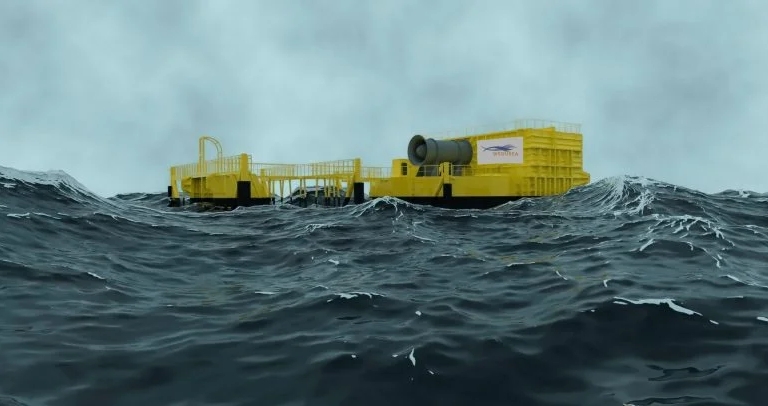
The European Union has approved a €19.6 million partnership project, WEDUSEA, which aims to advance wave energy towards large-scale commercialisation. The project, coordinated by Irish company OceanEnergy, brings together 14 partners from the UK, Ireland, France, Germany, and Spain, involving both industry and academia.
WEDUSEA is co-funded by the EU Horizon Europe Programme and Innovate UK, the UK’s innovation agency. Following a comprehensive independent review by EU-appointed experts, the project has received the necessary approval to proceed.
The project will demonstrate a 1MW OE35 floating wave energy converter at the European Marine Energy Centre (EMEC) in Orkney, Scotland. This two-year demonstration will assess the technical and environmental performance of the device in Atlantic wave conditions.
OceanEnergy developed the OE35, the world’s largest capacity floating wave energy device. It generates electricity by using wave pressures to oscillate water and drive trapped air through a turbine. The electricity will be exported to the UK grid via EMEC’s subsea cables.
Prof Tony Lewis, Chief Technical Officer at OceanEnergy, stated: “Wave energy is the world’s most valuable renewable resource with around 30TWh of potential annual production waiting to be harnessed. That’s almost ten times Europe’s annual electricity consumption. However, this potential has yet to be fully realised. The project will demonstrate that wave technology is on a cost reduction trajectory and will thus be a stepping stone to larger commercial array scale up and further industrialisation. We predict that the natural energy of the world’s oceans will one day supply much of the grid.”
The WEDUSEA project will proceed in three phases: the initial design and build of the wave energy device, a two-year demonstration period, and finally, commercialisation and dissemination to capitalise on the results.
Prof Lars Johanning of the University of Plymouth added: “The WEDUSEA partnership has worked hard to ensure that all detailed designs and planning are robust, to prove that the project is viable and that the project will be delivered within budget. Now we have received the green light from the EU, it’s all systems go!”
Construction of the wave energy converter will start in the second half of 2024, with the demonstration at EMEC expected to begin in June 2025.
The WEDUSEA Partnership Project
WEDUSEA stands for: ‘Wave Energy Demonstration at Utility Scale to Enable Arrays.’
This international partnership comprises the following 14 organisations:
Ocean Energy (New Wave Technologies Limited) – Ireland
Innosea – France
Advanced Simulation Technologies – Spain
Fraunhofer Gesellschaft zur Förderung der Angewandten Forschung eV – Germany
University College, Cork – Ireland
Gavin and Doherty Geosolutions Ltd – Ireland
Exceedence Ltd – Ireland
Wood – Ireland
Hydro Group PLC – UK
The European Marine Energy Research Centre – UK
Longitude Consulting Engineers Limited – UK
University of Plymouth – UK
Innosea Ltd – UK
Green Marine (UK) Ltd – UK